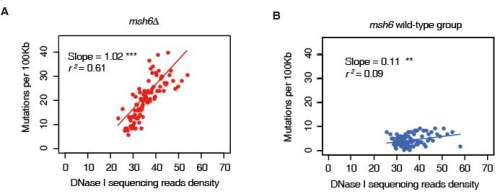Selective protection of genetic information by epigenetic system

DNA is replicated to pass genetic information to the daughter cells during cell proliferation. Replication errors, if not repaired, can lead to genetic mutations. For an individual organism, some DNA mutations may cause disease, even lethality. Robust DNA repair system exists in cells to ensure efficient correction of replication errors, and thus safeguard genetic fidelity. However, a small percentage of replication errors escape DNA repair, and provide an important basis for evolution. Epigenetics studies heritable phenotype changes that are not attributed to changes in DNA sequences. In fact, epigenetic systems can also directly impact DNA sequences.
In their study, researchers from ZHU Bing's group at the Institute of Biophysics of the Chinese Academy of Sciences analyzed rates of mutation in wild and mismatch repair deficient strains of the fission yeast, Schizosaccharomyces pombe, which had evolved for approximately 2,000 generations, using an experimental evolutionary approach.
They found that in the wild type strain, the mutation rate in the heterochromatic region was much higher than that in euchromatin, and this discrepancy was diminished in a mismatch repair-deficient strain. This indicates that the mismatch repair machinery preferentially protects genetic fidelity in euchromatin.
Further analysis indicated that this selectivity is determined by the variability of chromatin accessibility at distinct chromatin regions. They also found that mutation rates were positively correlated with chromatin accessibility in S. pombe and human colorectal cancer samples with deficiencies in mismatch repair. And this positive correlation was not observed in S. pombe and human colorectal cancer samples with functional mismatch repair machinery.
This study provides direct evidence for the impact of epigenetic systems in genetic fidelity.
The study, titled "Preferential Protection of Genetic Fidelity within Open Chromatin by the Mismatch Repair Machinery" was published online in the July 5 issue of Journal of Biological Chemistry.
More information: Lue Sun et al, Preferential Protection of Genetic Fidelity within Open Chromatin by the Mismatch Repair Machinery, Journal of Biological Chemistry (2016). DOI: 10.1074/jbc.M116.719971

















